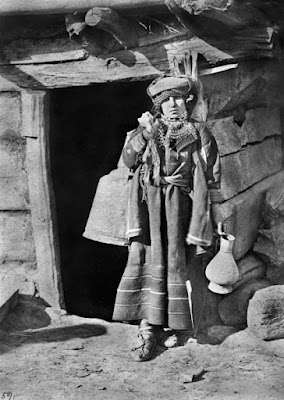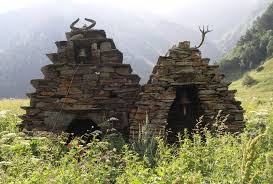The "Mesultane" - Messenger Between Worlds. An Ancient Georgian Profession
In the northeastern Georgian mountain villages, Pshav-Khevsureti and Tuscheti, there was a profession called "Mesultane"*.
The "Mesultane" was typically a female-gendered person, whose job was to speak for the deceased's soul and give their messages language. The name "Mesultane" can be translated as "soul's attendee" and understood as a medium between the dead and the living.
She performed her job either in death rites, - as a "Lamentor in Voice"* - or at her home, where she received people in need for guidance and clarification.
The "Mesultane" oughtn't to be simultaneously a "Lament in Voice" performer. But if she happened to be both, she would speak through the dead in her laments in the contexts of death rites. The lamenting text was then a first-person narrative of the dead person. This phenomenon, of being a conduit for the dead, was called in Khevsureti "Adzrakheba".
Other than in the context of death rites, the "Mesultane" would perform her job also at home, where she was visited either by the dead's soul or the living people and was asked to transfer a message from the dead to the living or vice versa.
On some occasions, she was contacted by the dead themselves. For example, if they had a warning of impending danger for the family or the overall village, like a looming stranger intrusion, or an ecological catastrophe, etc. But sometimes the dead just had the need to address unresolved issues and speak up things into awareness of the living.
Moreover, when she was asked for her services by the living, it was often due to dreams where the dead presented themselves, but the messages were not clear for the relatives. In other times, her translation skills were asked of, when there was some kind of hardship the person and her/ his family were encountering, like for example when the cattle got lost, or someone got sick, or the butter got spoilt, etc.
If you wonder, how a visit at the Mesultane's place may have looked like, here is a small extract from an anthropological text from 1975, that I have translated for you.*
A session at the "Mesultane's":
"Khevsuretians say, that the 'Mesultane' performed her job in presence with the 'Chirispatroni' (The person concerned, whose relative had died). The Mesultane would light a candle at the table and put a 'Khmiadi' (a piece of special bread for ritual occasions) on the table in the name of the deceased person. One candle would be held by the deceased's relative and the following text was spoken: "Where you are (they'd say the name of the dead person), is your place of being, as true as this set table, standing in front of us. It shell nourish your soul. If you are disturbed about a matter unknown to us, please appear and make the 'Mesultane', your tongue-voicer, speak for you." If the person was holding liquor, they would drink it at this point, attach the candle to the table and sit down. After this, the 'Mesultane's' tongue would be animated by the dead's soul. [...] They say, that the voice of the 'Mesultane' used to resemble that of the dead person. If the 'Mesultane' was having a hard time channeling, it was said that: "two souls are quarreling with each other. Both want to speak". In that case, the visitor would put a slice of bread and salt in the name of one of the dead, so the first soul was addressed, and the spirits would let each other speak. First one soul would come to her and then the other one. Sometimes the spirits talked on behalf of each other. If there was a small one, who had died before having reached a verbal age, often an elder soul would talk for her/ him: "I am standing for her/ him as a tongue, this one needs 'victuals', 'swaddling cloth' (etc.).""*
This is how a visit at the "Mesultane's" could have looked. She would not perform her job when she had eaten garlic, as it was reckoned that the dead didn't like the smell of garlic and avoided the reek of it. The "Mesultane" would also not hold her services whilst having a menstrual cycle.
In Khevsureti, the "Mesultane" needed to be at least eight or nine years old to step into her profession. In Tuscheti the age mark was eighteen years.
Sometimes the "Mesultane" was also a "Qadagi". "Qadagi" was a high authority figure of the commune, who was similarly like the "Mesultane" a medium, but one between the gods and the people.
* "Mesultane"/ "მესულთანე" was the name in Khevsureti. In Tuscheti she was called "Sultana"/ "სულთანა"
* "Lament in Voice" is a particular lamenting style in Pshav-Khevsureti and Tuscheti. It was distinguishable due to its high poetic and musical value. For more detailed information you can visit "What is Lament in Voice"?: https://georgianlamentation.blogspot.com/2021/04/what-is-lament-in-voice.html
* In: D. Giorgadze, Masalebi Sakartvelos Ethnographiistvis, Vol. XVIII, Mecniereba 1975, P. 179-180./ დ. გიორგაძე, მასალები საქართველოს ეთნოგრაფიისთვის, ტ. XVIII, მეცნიერება 1975, გვ. 179-180.
"ხევსური მთხრობელის გადმოცემით კი, სულთანობა ჭირისპატრონის თანდასწრებით ხდებოდა. იგი ტაბლას გარშემო სანთლებს აანთებდა, ხმიადებს რომელიმე იქ დამსწრე პირის სახელს დასდებდა და დაჯდებოდა. ერთ ანთებულ სანთელს ჭირისპატრონი ან მოკეთე დაიჭერდა და ამბობდა: "საცა შენ ხარ (მიცვალებულის სახელს იტყოდა), შენ სადგომ-სამყოფოი ას, როგორც ჩვენს წინ ას ეს გამზადებული სუფრაი, სულსამც შენს მაეჰმარების, თუ რა გაღონებს, ჩვენ ვერ ვიცოდეთ, გამოგვიცხადი, ათქმი შენს მეენეს, მესულთანეს". თუ ამ სიტყვების მთქმელს არაყი ეჭირა დალევდა, სანთელს სუფრას მიაკრავდა და დაჯდებოდა. ამის შემდეგ მესულთანეს მკვდარი აალაპარაკებდა, [...] მთხრობელთა გადმოცემით მესულეთე დედაკაცი ზუსტად იმ მიცვალებულის ხმით ლაპარაკობდა, რომლის პატრონიც იყო მოსული. ზოგჯერ მესულეთეს უძნელდებოდა ხოლმე სულთანობის დაწყება. ასეთ შემთხვევაში იტყოდნენ: "ორი სული ერთმანეთს ეცილებისო, ორთავ უნდა საუბარიო". ამიტომ, სახელს დასდებდნენ ჯერ პურს და მარილს. სულები ერთმანეთს შეეცვლებოდნენ: მესულთანეს ჯერ ერთი სული მოუვიდოდა, მერე მეორე, ერთმანეთის მაგივრადაც იცოდნენ სულებმა ლაპარაკი. თუ პატარა ვინმე იყო მიცვალებული, რომელსაც ლაპარაკი არ ეხერხებოდა, არ შეეძლო, მის მაგიერ უფროსი ილაპარაკებდა: "მე უდგეორავ მეენედავ, ამას სჭირდების "საგძალი", "სახვიელი", და სხვ."



Comments
Post a Comment